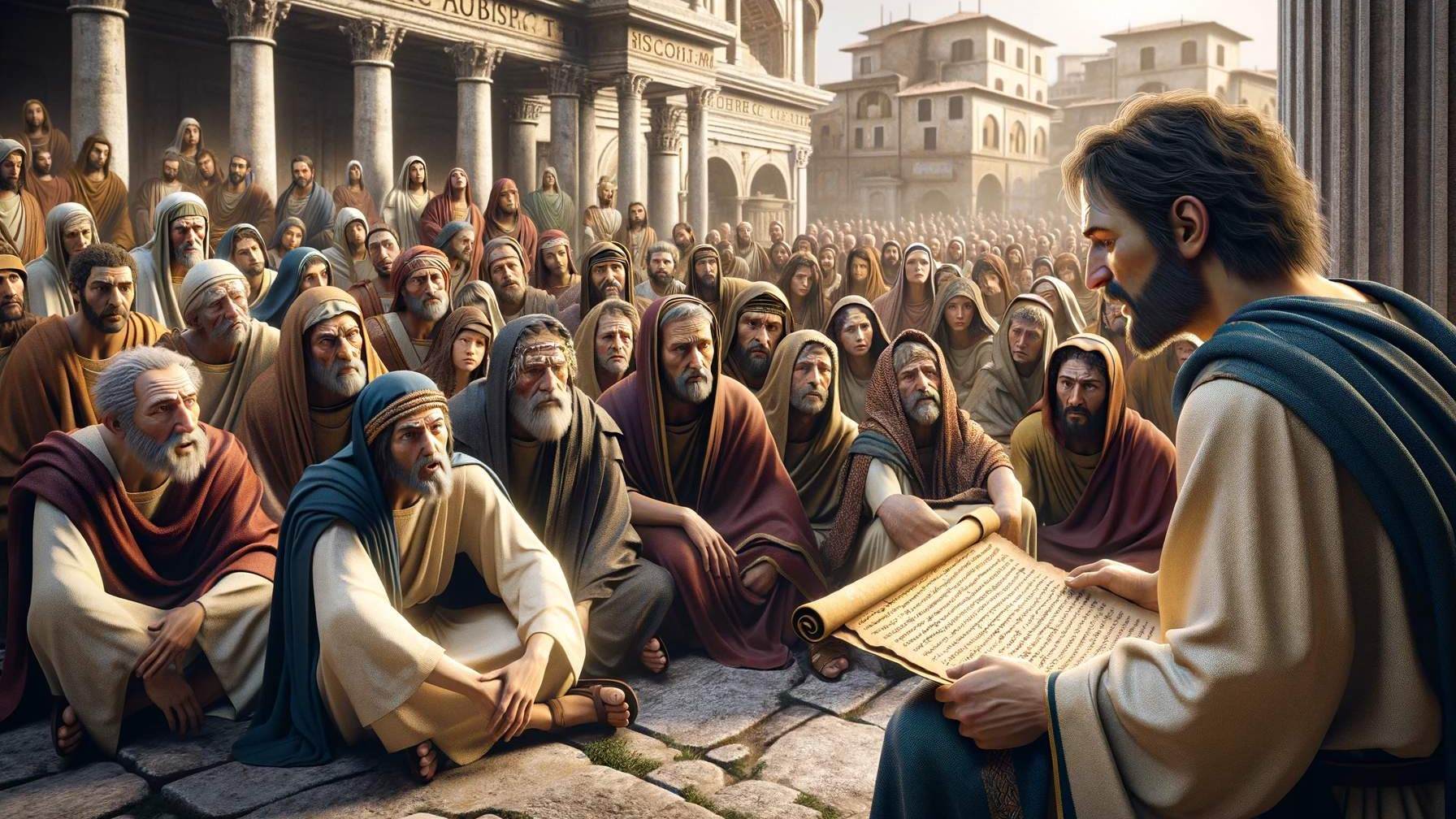Home>Bible Facts>Who Was The Book Of Revelation Written For?


Bible Facts
Who Was The Book Of Revelation Written For?
Published: February 11, 2024
Peter Smith, Editorial Director at Christian.net, combines deep insights into faith, politics, and culture to lead content creation that resonates widely. Awarded for his contributions to religious discourse, he previously headed a major organization for religious communicators, enhancing dialogue on faith's societal impacts.
Discover the intended audience of the Book of Revelation and gain valuable insights into its significance with these fascinating Bible facts. Explore the purpose and relevance of this profound text.
(Many of the links in this article redirect to a specific reviewed product. Your purchase of these products through affiliate links helps to generate commission for Christian.net, at no extra cost. Learn more)
Table of Contents
Introduction
The Book of Revelation, also known as the Apocalypse, is the final book of the New Testament. It is a profound and enigmatic work that has captivated readers for centuries. This apocalyptic text is filled with vivid imagery, symbolic language, and prophetic messages that have sparked intense debate and speculation. The Book of Revelation is often regarded as one of the most challenging and mysterious books in the Bible, and its complex nature has led to a wide range of interpretations and theories.
As we delve into the fascinating world of the Book of Revelation, we will explore its intended audience, historical context, and overarching purpose. By gaining a deeper understanding of these key aspects, we can unravel the timeless significance of this extraordinary book and appreciate its enduring relevance.
The Book of Revelation is a literary masterpiece that transcends time and space, offering profound insights into the nature of faith, perseverance, and the ultimate triumph of good over evil. It is a compelling narrative that unfolds with dramatic intensity, drawing readers into a cosmic drama that encompasses the struggles and triumphs of humanity. As we embark on this exploration, we will journey through the intricate tapestry of symbols, visions, and prophecies that form the rich fabric of the Book of Revelation.
Join me as we embark on a captivating journey through the Book of Revelation, unraveling its mysteries and uncovering the profound truths that continue to resonate with believers and seekers alike. Let us embark on this enlightening quest to discover the timeless relevance and enduring power of the Book of Revelation.
Read more: When Was Book Of Revelation Written
The Audience of the Book of Revelation
The Book of Revelation was originally written for a specific audience, and understanding the context of its recipients is crucial to comprehending its profound message. The book itself opens with a series of letters addressed to seven churches in Asia Minor, providing valuable insights into the intended audience of this apocalyptic work. These seven churches, located in Ephesus, Smyrna, Pergamum, Thyatira, Sardis, Philadelphia, and Laodicea, were facing various challenges and trials, both internally and externally.
The messages to these churches were tailored to address their specific circumstances, offering encouragement, admonition, and prophetic warnings. The audience of the Book of Revelation, therefore, encompassed the early Christian communities in these regions, who were grappling with persecution, doctrinal challenges, and the pressures of living in a society dominated by pagan beliefs and practices.
The vivid imagery and symbolic language employed in the Book of Revelation resonated deeply with its original audience, as they grappled with the harsh realities of their time. The apocalyptic visions and prophecies provided hope, assurance, and a sense of divine justice in the face of adversity. The book's powerful portrayal of the ultimate victory of good over evil and the establishment of God's eternal kingdom offered solace and inspiration to the early Christians who faced persecution and uncertainty.
Furthermore, the universal themes of faith, endurance, and the triumph of righteousness found in the Book of Revelation continue to resonate with believers across different epochs and cultures. The timeless relevance of its message transcends the boundaries of time and space, speaking to the hearts of all who seek hope, courage, and spiritual renewal.
In essence, the original audience of the Book of Revelation comprised the early Christian communities in Asia Minor, but its enduring impact extends to all who seek to find meaning and purpose in the midst of life's trials and tribulations. The book's profound message continues to inspire and uplift readers, offering a vision of hope and redemption that transcends the challenges of any era.
The Historical Context of the Book of Revelation
The historical context of the Book of Revelation is integral to comprehending its profound significance and enduring impact. The book was authored by the apostle John while he was exiled on the island of Patmos, during the reign of the Roman emperor Domitian in the late first century. This period was marked by intense persecution of Christians and the pervasive influence of Roman imperial cult worship, which demanded allegiance to the emperor as a deity. The socio-political landscape was fraught with religious and political tensions, creating a climate of fear and uncertainty for early Christians.
Against this backdrop, the Book of Revelation emerged as a powerful testament to the unwavering faith and resilience of the early Christian communities. Its apocalyptic imagery and prophetic messages provided a compelling narrative of hope and divine justice in the face of persecution and oppression. The symbolic language and vivid visions served as a source of encouragement and reassurance, depicting the ultimate triumph of God's kingdom over the forces of darkness and tyranny.
Moreover, the historical context of the book sheds light on the pervasive influence of Roman imperial ideology, which sought to assert dominion over all aspects of life. The emperor's cult demanded absolute loyalty and worship, posing a direct challenge to the monotheistic faith of the early Christians. In this volatile environment, the Book of Revelation served as a powerful declaration of the sovereignty of God and the ultimate defeat of all earthly powers that sought to usurp divine authority.
The book's vivid portrayal of cosmic conflict and the ultimate vindication of the faithful resonated deeply with its original audience, offering a profound sense of hope and purpose amidst adversity. The historical context of persecution and religious oppression provided the backdrop for the book's powerful imagery and prophetic pronouncements, infusing its message with relevance and urgency.
In essence, the historical context of the Book of Revelation illuminates the profound challenges faced by early Christians and the enduring relevance of its message in the face of adversity. The book's timeless themes of faith, perseverance, and the ultimate triumph of good over evil continue to inspire and uplift readers across generations, offering a vision of hope and divine justice that transcends the trials of any era.
The Purpose of the Book of Revelation
The Book of Revelation serves a multifaceted purpose that resonates across time and space, offering profound insights into the nature of faith, divine justice, and the ultimate triumph of good over evil. At its core, the book is a powerful testament to the sovereignty of God and the fulfillment of His divine plan for humanity. Its purpose can be elucidated through several key dimensions:
1. Prophetic Encouragement and Warning
The Book of Revelation serves as a prophetic message of encouragement and warning to the early Christian communities facing persecution and tribulation. Through its vivid imagery and symbolic language, the book conveys a message of hope, perseverance, and divine vindication for the faithful. It offers reassurance in the face of adversity and warns against the allure of worldly powers and false ideologies that seek to undermine the truth of the Gospel.
2. Cosmic Conflict and Divine Justice
The book portrays a cosmic conflict between the forces of good and evil, culminating in the ultimate triumph of God's kingdom. It vividly depicts the unfolding of divine justice and the defeat of all forms of oppression, tyranny, and spiritual wickedness. The purpose of the Book of Revelation is to instill a profound sense of hope and assurance in the hearts of believers, reminding them that God's sovereignty prevails over all earthly powers and that righteousness will ultimately prevail.
3. Unveiling of Spiritual Realities
The book serves to unveil profound spiritual realities and unveil the eternal truths that transcend the temporal realm. Its apocalyptic visions and symbolic language offer a glimpse into the heavenly realms and the unfolding of God's redemptive plan for humanity. By peeling back the veil between the seen and unseen, the Book of Revelation invites readers to contemplate the deeper mysteries of faith and the ultimate fulfillment of God's purposes.
4. Encouragement for Endurance and Faithfulness
The purpose of the Book of Revelation is to encourage endurance and faithfulness in the face of trials and tribulations. Its messages to the seven churches exhort believers to remain steadfast in their commitment to the Gospel, despite the challenges and persecutions they may encounter. The book offers a vision of the ultimate reward for those who persevere in their faith, inspiring readers to remain faithful in the midst of adversity.
In essence, the Book of Revelation serves as a profound testament to the enduring sovereignty of God, the fulfillment of His divine plan, and the ultimate triumph of righteousness. Its multifaceted purpose encompasses prophetic encouragement, cosmic conflict, unveiling of spiritual realities, and exhortation for endurance and faithfulness. This extraordinary book continues to inspire and uplift readers across generations, offering a timeless message of hope, perseverance, and the ultimate victory of good over evil.
Conclusion
In conclusion, the Book of Revelation stands as a timeless testament to the enduring power of faith, the ultimate triumph of good over evil, and the fulfillment of God's divine plan for humanity. Its enigmatic symbolism, vivid imagery, and prophetic messages continue to captivate and inspire readers across generations, offering profound insights into the nature of divine justice, perseverance, and the eternal victory of God's kingdom.
The book's original audience, comprising the early Christian communities in Asia Minor, faced intense persecution, doctrinal challenges, and the pervasive influence of Roman imperial cult worship. In this tumultuous context, the Book of Revelation emerged as a source of hope, encouragement, and prophetic warning, addressing the specific circumstances and trials faced by the seven churches in Asia Minor. Its messages of endurance, faithfulness, and the ultimate vindication of the faithful resonated deeply with its original recipients, offering a vision of divine justice and the triumph of righteousness in the face of adversity.
Furthermore, the historical context of the book, set against the backdrop of Roman imperial oppression and religious persecution, illuminates the urgency and relevance of its message. The book's portrayal of cosmic conflict and the ultimate victory of God's kingdom over the forces of darkness provided a compelling narrative of hope and divine justice in the midst of societal upheaval and uncertainty. Its profound themes of faith, perseverance, and the sovereignty of God continue to resonate with readers, offering a timeless message of hope and assurance in the face of life's trials and tribulations.
The purpose of the Book of Revelation is multifaceted, encompassing prophetic encouragement, cosmic conflict, unveiling of spiritual realities, and exhortation for endurance and faithfulness. Through its rich tapestry of symbolism and visionary language, the book offers a profound glimpse into the unfolding of God's redemptive plan for humanity, inspiring readers to remain steadfast in their faith and hopeful in the ultimate fulfillment of God's promises.
In essence, the Book of Revelation transcends its historical and cultural context, offering a timeless message of hope, divine justice, and the ultimate triumph of good over evil. Its enduring relevance and profound significance continue to resonate with believers and seekers alike, inviting readers to contemplate the deeper mysteries of faith and find solace in the assurance of God's ultimate victory. As we conclude our exploration of the Book of Revelation, may its timeless message continue to inspire and uplift all who seek hope, courage, and spiritual renewal in the midst of life's challenges.














